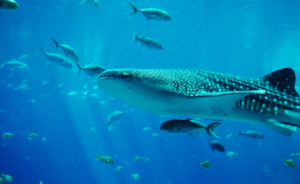Conservation and Biodiversity
Don’t throw sharks shade: They’re key to ocean ecosystems
August 1, 2019
It’s Shark Week, Discovery Channel’s eight days of shark programming. All week we’ll binge TV shows like “Laws of Jaws: Dangerous Waters,” “Capsized: Blood in the Water” and “Great White Kill Zone.” Who’s ready to see some blood-thirsty killers on the prowl?
As these show titles suggest, sharks get a bad rap.
“Sharks are often thought of as mindless predators with an insatiable tendency for attacking humans,” said Ryan Murray, a shark researcher at Large Marine Vertebrates Research Institute Philippines, in an email to Earth Day Network. “This misconception has been largely fueled by sensationalized movies or media outlets which tend to boost biased news stories to generate and maximize ratings.”
Sharks, no matter how frightening they’re portrayed, are vital parts of ecosystems. Whenever we portray sharks as hungry, dangerous predators, we lose a chance to talk about their importance. And when we see sharks in this latter lens, we realize how fascinating, and fragile, they are.
Who’s the real villain?
On average, sharks kill six humans per year. Conversely, humans kill 100 million sharks per year. We’re villifying the wrong species.

Sharks are in rapid decline. This decline can be linked to increasing human populations and the industrialization of commercial fishing. This vulnerable landscape, combined with sharks’ natural life cycles, makes for a shaky future.
Sharks mature later in life, reproducing infrequently and giving birth to relatively few pups, explained Murray. Sharks must navigate waters of fishing nets and hooks for years until they’re old enough to pass their genes onto the next generation. One study suggested that a quarter of shark species are at risk from unsustainable fishing practices.
And then there’s finning, a particularly grotesque fishing practice. Fishermen catch sharks, cut off their fins and throw the finless sharks back into the water. No longer able to swim, the sharks simply drown. The fins are then used in upscale dishes like shark fin soup, as well as traditional medicines.
Fins from up to 73 million sharks are estimated to hit the global market every year. Shark finning is illegal in U.S. waters, but the Shark Fin Sales Elimination Act of 2019, currently before Congress, would make it illegal to possess, buy or sell shark fins or any product containing shark fins. Tell Congress to pass the Shark Fin Sales Elimination Act of 2019.
Other threats to sharks include pollution and climate change, the latter driving warmer sea temperatures and ocean acidification that degrade shark habitats and affect shark development and behavior.
Just because they’re predators doesn’t mean they’re bad
Sharks are apex predators, or predators at the top of the food chain. But that doesn’t mean they’re bad. Lions are also apex killers, but unless they’re named Scar, we give them a pass.
“Instead of only highlighting and promoting the fear of sharks, we should be answering questions like, ‘What are their feeding behaviors? Where do they like to go?’” says Earth Day Network Protect Our Species Campaign Manager Katie Wood.
Answering these questions will provide insight on shark management plans and sharks’ influence on ecosystems. A study published in the science journal PLOS ONE, showed that a high density of apex predators may actually increase the resilience of coral reef ecosystems from warmer waters and other effects of climate change.
Apex predators like sharks also keep in check certain species of fish. Without sharks, mid-level species overconsume species at the bottom of the food chain. When this happens, entire ecosystems can collapse.
“When we are hearing about the disconcerting decline of sharks around the globe, we also need to consider the bigger picture of the knock-on effects this may have on marine ecosystems as a whole,” said Murray.
Shark attacks sell
While focusing on the more sensational aspects of shark attacks may strike box office gold, outside of Hollywood, shark attacks are remarkably rare. In 2018, there were 66 unprovoked shark attacks. That’s a one in 3.75 million chance of being attacked by sharks — you’re more likely to be hit by an asteroid than bitten a shark.
“What a lot of people don’t realize is that sharks consume relatively small prey such as flying fish, squid and reef fish so being human sized automatically removes us from the menu for the vast majority of shark species,” said Murray.
When sharks do attack, it’s often a case of mistaken identity. Sharks lack long appendages, so they rely on their mouths — and consequently, their bite — to investigate foreign objects. Humans sometimes are just in the wrong place at the wrong time. Next time you swim in the ocean, remember that you’re a guest in their home, not the other way around.
Become a shark scientist
Observing and collecting data on sharks can be a daunting and costly practice. Even full-time researchers have trouble gathering all the information they need to conserve shark habitats. Research institutes rely on donations, as well as volunteers, to carry out their objectives. They also rely on contributions from citizen scientists.
Citizen science brings together amateur scientists — students, educators, enthusiasts — to gather data that supports research. In the case of sharks, citizen scientists contribute photos and videos that shed light on sharks’ behaviors and locations.

“Think of it like a community-based, inexpensive tracking system,” said Murray.
The Large Marine Vertebrates Research Institute Philippines, for example, uses marine tourists to contribute data to its studies on sharks in the Philippines. Citizen science helps the institute build national population catalogues for sharks that answer important questions about their populations. Online platforms like Whaleshark.org let citizen scientists upload images of shark sightings to their international database.
To support global citizen science efforts, Earth Day Network recently partnered with the Wilson Center and the U.S. Department of State to launch the world’s largest coordinated citizen science campaign, Earth Challenge 2020. Sign up to learn more about how you can help.
People should not fear or vilify sharks, but rather respect them for what they are: valuable, complex and curious species that live within a mysterious oceanic landscape. Learn more about how you can protect sharks at Earth Day Network’s Protect Our Species campaign and Sharks page.
